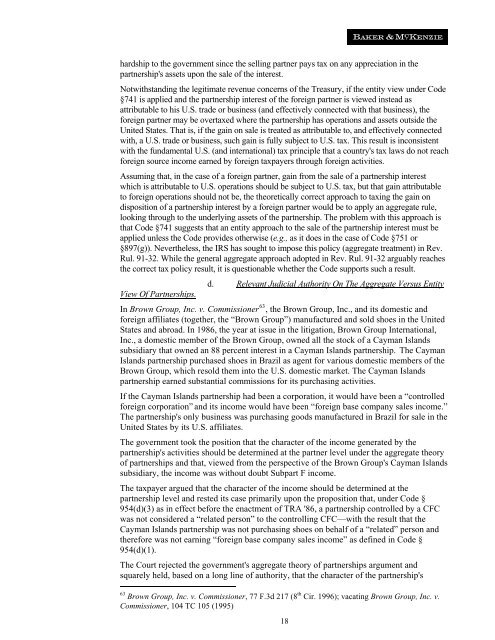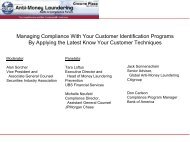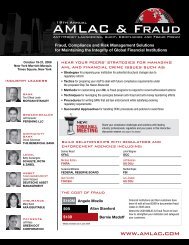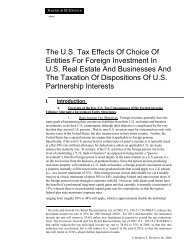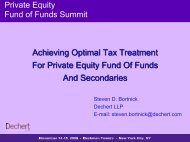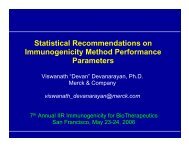The US Tax Effects Of Choice Of Entities For Foreign Investment - IIR
The US Tax Effects Of Choice Of Entities For Foreign Investment - IIR
The US Tax Effects Of Choice Of Entities For Foreign Investment - IIR
Create successful ePaper yourself
Turn your PDF publications into a flip-book with our unique Google optimized e-Paper software.
hardship to the government since the selling partner pays tax on any appreciation in the<br />
partnership's assets upon the sale of the interest.<br />
Notwithstanding the legitimate revenue concerns of the Treasury, if the entity view under Code<br />
§741 is applied and the partnership interest of the foreign partner is viewed instead as<br />
attributable to his U.S. trade or business (and effectively connected with that business), the<br />
foreign partner may be overtaxed where the partnership has operations and assets outside the<br />
United States. That is, if the gain on sale is treated as attributable to, and effectively connected<br />
with, a U.S. trade or business, such gain is fully subject to U.S. tax. This result is inconsistent<br />
with the fundamental U.S. (and international) tax principle that a country's tax laws do not reach<br />
foreign source income earned by foreign taxpayers through foreign activities.<br />
Assuming that, in the case of a foreign partner, gain from the sale of a partnership interest<br />
which is attributable to U.S. operations should be subject to U.S. tax, but that gain attributable<br />
to foreign operations should not be, the theoretically correct approach to taxing the gain on<br />
disposition of a partnership interest by a foreign partner would be to apply an aggregate rule,<br />
looking through to the underlying assets of the partnership. <strong>The</strong> problem with this approach is<br />
that Code §741 suggests that an entity approach to the sale of the partnership interest must be<br />
applied unless the Code provides otherwise (e.g., as it does in the case of Code §751 or<br />
§897(g)). Nevertheless, the IRS has sought to impose this policy (aggregate treatment) in Rev.<br />
Rul. 91-32. While the general aggregate approach adopted in Rev. Rul. 91-32 arguably reaches<br />
the correct tax policy result, it is questionable whether the Code supports such a result.<br />
View <strong>Of</strong> Partnerships.<br />
d. Relevant Judicial Authority On <strong>The</strong> Aggregate Versus Entity<br />
In Brown Group, Inc. v. Commissioner 63 , the Brown Group, Inc., and its domestic and<br />
foreign affiliates (together, the “Brown Group”) manufactured and sold shoes in the United<br />
States and abroad. In 1986, the year at issue in the litigation, Brown Group International,<br />
Inc., a domestic member of the Brown Group, owned all the stock of a Cayman Islands<br />
subsidiary that owned an 88 percent interest in a Cayman Islands partnership. <strong>The</strong> Cayman<br />
Islands partnership purchased shoes in Brazil as agent for various domestic members of the<br />
Brown Group, which resold them into the U.S. domestic market. <strong>The</strong> Cayman Islands<br />
partnership earned substantial commissions for its purchasing activities.<br />
If the Cayman Islands partnership had been a corporation, it would have been a “controlled<br />
foreign corporation” and its income would have been “foreign base company sales income.”<br />
<strong>The</strong> partnership's only business was purchasing goods manufactured in Brazil for sale in the<br />
United States by its U.S. affiliates.<br />
<strong>The</strong> government took the position that the character of the income generated by the<br />
partnership's activities should be determined at the partner level under the aggregate theory<br />
of partnerships and that, viewed from the perspective of the Brown Group's Cayman Islands<br />
subsidiary, the income was without doubt Subpart F income.<br />
<strong>The</strong> taxpayer argued that the character of the income should be determined at the<br />
partnership level and rested its case primarily upon the proposition that, under Code §<br />
954(d)(3) as in effect before the enactment of TRA '86, a partnership controlled by a CFC<br />
was not considered a “related person” to the controlling CFC—with the result that the<br />
Cayman Islands partnership was not purchasing shoes on behalf of a “related” person and<br />
therefore was not earning “foreign base company sales income” as defined in Code §<br />
954(d)(1).<br />
<strong>The</strong> Court rejected the government's aggregate theory of partnerships argument and<br />
squarely held, based on a long line of authority, that the character of the partnership's<br />
63 Brown Group, Inc. v. Commissioner, 77 F.3d 217 (8 th Cir. 1996); vacating Brown Group, Inc. v.<br />
Commissioner, 104 TC 105 (1995)<br />
18


